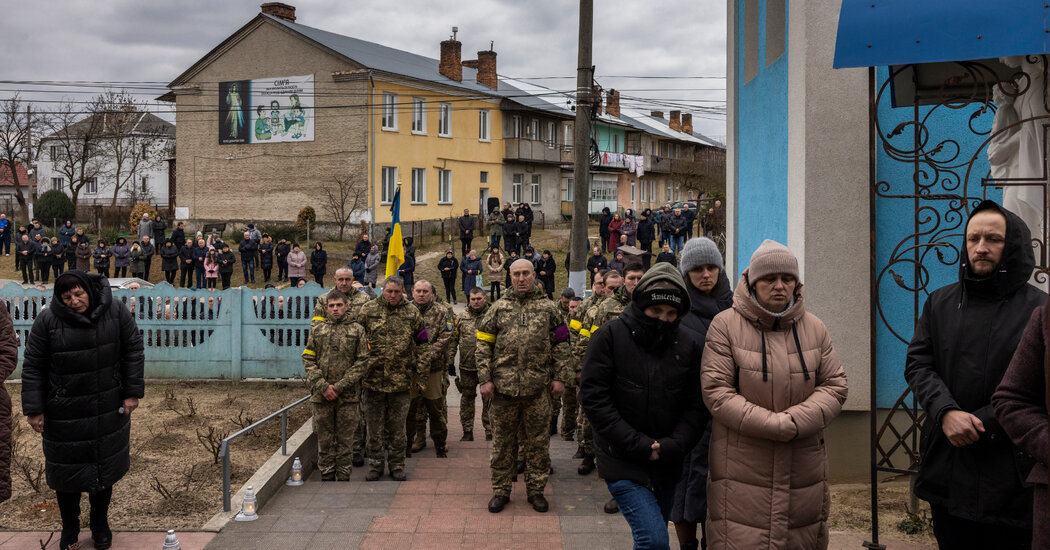
LVIV, Ukraine — Trapped in his apartment on the outskirts of Kyiv during fierce battles over the weekend, the well-known Ukrainian poet Oleksandr Irvanets composed a few lines that encapsulated the national mood.
“I shout out to the whole world,” he wrote in a short poem published online by his fans, who have since lost touch with the writer and were worried that he may have fallen behind Russian lines. “I won’t forgive anyone!”
If there is one overriding emotion gripping Ukraine right now, it is hate.
It is a deep, seething bitterness for President Vladimir V. Putin, his military and his government. But Ukrainians are not giving a pass to ordinary Russians, either, calling them complicit through years of political passivity. The hatred is vented by mothers in bomb shelters, by volunteers preparing to fight on the front lines, by intellectuals and by artists.
The emotion is so powerful it could not be assuaged even by an Orthodox religious holiday on Sunday intended to foster forgiveness before Lent. Called Forgiveness Sunday, the holiday is recognized in both the Russian and Ukrainian Orthodox churches.
Billboards have gone up along roadsides in gigantic block letters, telling Russians in profanity-laced language to get out. Social media posts in spaces often shared by Russians and Ukrainians have been awash in furious comments.
Some Ukrainians have posted pictures of people killed in the military assault in Russian chat rooms on the Telegram app. They have vented by writing on the reviews pages for websites of Moscow restaurants.
And they have been mocking Russians in scathing terms for complaining about hardships with banking transactions or the collapsing ruble currency because of international sanctions.
“Damn, what’s wrong with Apple Pay?” Stanislav Bobrytsky, a Ukrainian computer programmer also trapped in the fighting around the capital, Kyiv, wrote sarcastically about how Russians are responding to the war. “I cannot pay for a latte in my favorite coffee shop.”
Mr. Putin is the target of much of the Ukrainians’ unbridled resentment.
The authoritarian leader is to blame, almost all Ukrainians agree. But the frustration is also directed more broadly at Russian society.
Many Ukrainians chastise Russians for increasingly accepting middle-class comforts afforded by the country’s oil wealth in exchange for declining to resist limits on their freedoms. They blame millions of Russians, who Ukrainians say gave up on the post-Soviet dreams of freedom and openness to the West, for enabling the war.
“Are your iPhones all right?” another Ukrainian writer, Andriy Bondar, asked Russians on his Facebook page, after a thinly attended antiwar rally in Moscow that was broken up by the riot police. “We are very worried about you. It’s so cruel they use rubber sticks, those terrible riot police.”
President Volodymyr Zelensky of Ukraine also appealed to Russians on Sunday to protest for their own sakes as much as for the Ukrainians.
“Don’t miss this opportunity,” he said in comments directed at Russians.
“Citizens of Russia, for you this is a struggle not only for peace in Ukraine, it is a struggle for your country, for the best that was in it, for the freedom that you saw, for the prosperity that you felt,” he added. “If you keep silent now, then only your poverty will speak for you later, and only repression will answer. Do not be silent!”
Mr. Zelensky did not hold back on how he felt about the Russian military.
“We will not forgive the shooting of unarmed people,” he said.
There were virtually no antiwar protests in Russia before the conflict began, though small demonstrations have been staged in recent days. Most participants were arrested.
Yuri Makarov, the chief editor of the Ukrainian national broadcasting company and the head of a national literature and arts award committee, said the war had driven a deep wedge between the Ukrainian and Russian societies that will be hard to heal. Russians, he said, have become Ukrainians’ “collective enemies.”
Some modicum of popular support is enabling the fighting, he said.
“The orders to shell the residential areas of Mariupol, Kharkiv and Zhytomyr were given by specific colonels, captains and junior lieutenants, not by Putin or Shoigu,” he said, referring to the Russian president and his minister of defense, Sergei K. Shoigu. “It is their choice and their responsibility,” he added.
Russia-Ukraine War: Key Things to Know
“As for the Russians, I am not interested in their motivation now. They, with the exception of a few, were quite comfortable being in a full dictatorship,” he added.
Olha Koba, a psychologist in Kyiv, said that “anger and hate in this situation is a normal reaction and important to validate.” But it is important to channel it into something useful, she said, such as making incendiary bombs out of empty bottles.
“When people are happy about the death of Russian soldiers, it is explicable,” she said. “There is a subconscious understanding that this soldier will no longer be able to kill their loved ones.”
Mr. Irvanets, the poet who sent his bitter composition to friends over the weekend, wrote that he had composed the lines in “a city shattered by missiles,” and he referenced the upcoming holiday on Sunday.
But by Forgiveness Sunday, his fans were writing on social media that he had not been in contact and they were concerned that something had happened to him.
“I will never forgive Russia,” the poet wrote.
Andrew E. Kramer contributed reporting from Kyiv.




